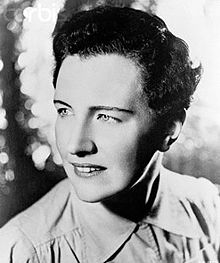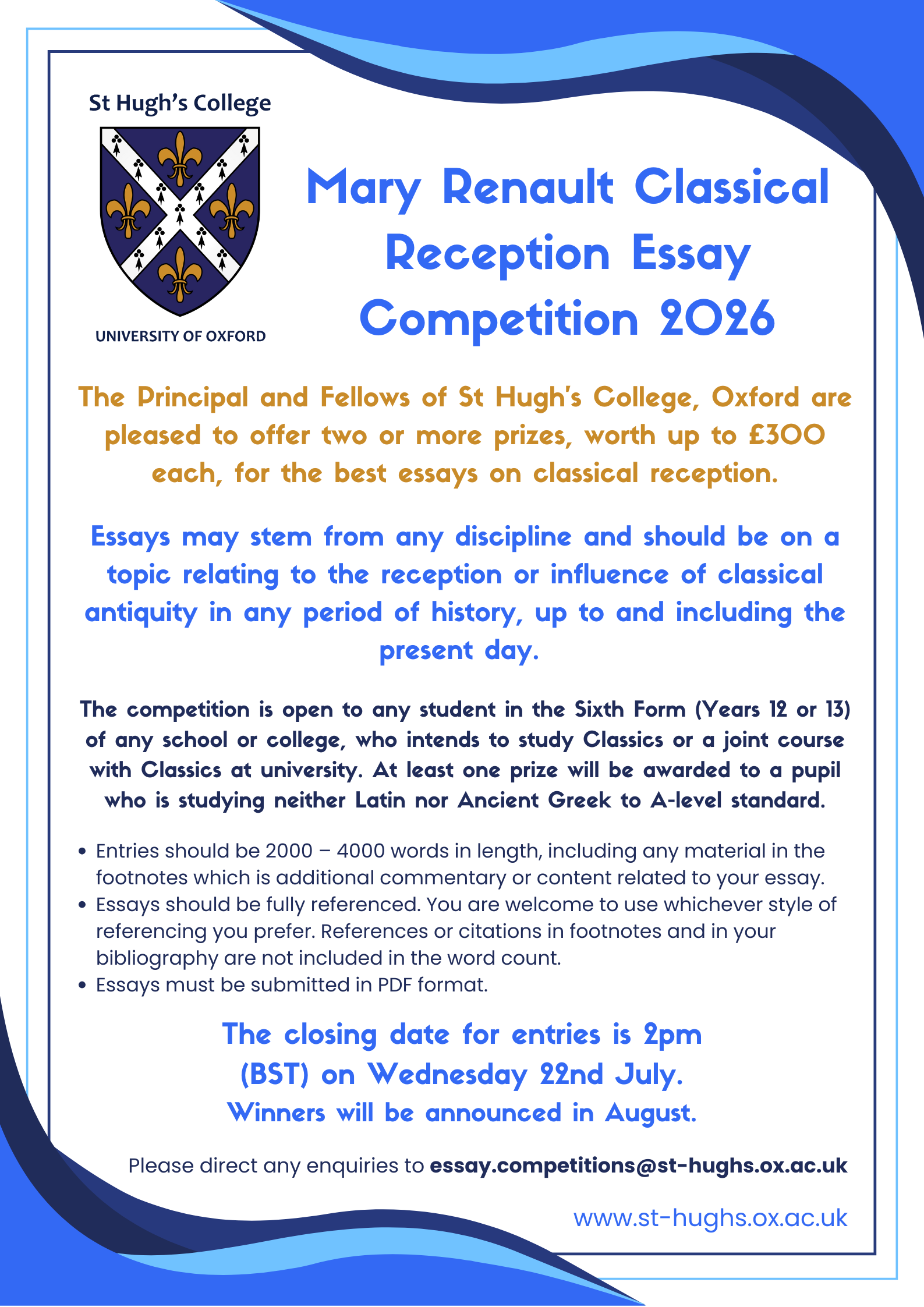Who was Mary Renault?

This biography below is taken from the St Hugh’s College exhibition, recently on show in the Howard Piper Library.
‘Eileen Mary Challans was born on 4th Sept 1905, the daughter of Frank Challans, a medical practitioner. She attended Romford House School, Forest Gate, and Clifton High School, Bristol before matriculating at St Hugh’s in Oct 1925 to read English Language and Literature, obtaining a BA (III) in 1928.
During her time at St Hugh’s, she developed a love of ancient Greece, Crete and Macedon – a setting which resurfaced in many of her novels. Although she had initially intended to become a teacher, in 1933, after a period of illness, she returned to Oxford and became a nurse at the Radcliffe Infirmary, obtaining a nursing degree in 1936. Here she met her lifelong partner, Julie Mullard.
She published her first novel, a hospital romance called Purposes of Love, in 1939, under the pseudonym Mary Renault, the name by which she became known. She continued to write and publish whilst nursing during WWII and her novels developed overtly homosexual themes, which she treated honestly and sympathetically. Her sixth and last non-historical novel, The Charioteer, was published in 1953. Mary moved on to writing historical novels set in Ancient Greece, eventually publishing eight, the first being The Last of the Wine in 1956 and the last Funeral Games in 1981.
Although her portrayals of homosexuality provoked outrage in British society at the time, MGM presented her an award for her 4th novel, Return to Night, and she was able to afford to emigrate with Julie to South Africa in 1948, never to return to England. They both became South African citizens and were involved in the early anti-apartheid movement.’
The Mary Renault Competition 2026 is now open for entries!
The Principal and Fellows of St Hugh’s College, Oxford are pleased to offer two or more prizes, worth up to £300 each, for the best essays on classical reception.
Essays may stem from any discipline and should be on a topic relating to the reception or influence of classical antiquity in any period of history, up to and including the present day.
The competition is open to any student in the Sixth Form (Years 12 or 13) of any school or college, who intends to study Classics or a joint course with Classics at university. At least one prize will be awarded to a pupil who is studying neither Latin nor Ancient Greek to A-level standard.
- Entries should be 2000 – 4000 words in length, including any material in the footnotes which is additional commentary or content related to your essay.
- Essays should be fully referenced. You are welcome to use whichever style of referencing you prefer. References or citations in footnotes and in your bibliography are not included in the word count.
- Essays must be submitted in PDF format.
How to enter
Entering the competition requires you to complete two separate steps, as described below. These steps should be completed in immediate succession. Please DO NOT complete Step 1 until you are also ready to complete Step 2. Registration forms for which the corresponding essay is not uploaded within 24 hours will be deleted.
Step 1
Fill in this registration form. You will be asked to enter your personal and contact details and the name of your essay.
Step 2
After completing the form in Step 1, you will receive an automated email containing the link to the submission portal, and full instructions on how to complete your submission. Please make sure that you read and follow these instructions carefully to ensure that your submission can be processed successfully.
Upon completing your submission, you will receive another automated email confirming that we have received your entry.
The deadline for completing your submission is 2pm (BST) on Wednesday 22nd July 2026. Entries received after this point will not be considered.
You are strongly encouraged to complete your submission well in advance of this deadline, to ensure that you have time to request assistance in the event of any technical issues. We may not be able to respond to individual queries received too close to the deadline.
If you have any questions about entering the competition, please check the FAQs before contacting us over email. If your question is not answered by the FAQs, or if you experience any issues with completing your submission, please get in touch with us at essay.competitions@st-hughs.ox.ac.uk.
2025 Mary Renault Prize Winners
Thank you to everyone who entered the 2025 Mary Renault competition. The prizes were awarded as follows:
Winners
Chloe Cam – Townley Grammar School, Kent (Year 12)
The Post-Colonial Nostos: Reception Of Homer’s Odyssey In Derek Walcott’s Omeros
Holly Scrimgeour – North London Collegiate School, Edgware (Year 12)
Srilakshmi Sen – King Edward VI High School for Girls, Birmingham (Year 12)
The Learned Heathen: Love and Respectability in E.M Forster’s Maurice
Highly Commended
Mia Clarkson – Ripon Grammar School, Yorkshire (Year 13)
The Oedipal Present: Feminism, Religion, and Global Crisis in Ella Hickson’s Postmodern OEDIPUS
Mehreen Hakim – The London Academy of Excellence (Year 12)
Ella Needham – Guildford High School (Year 12)
From Troy to Total War: Pro-Greek, Anti-Trojan Interpretations of the Iliad
Blanka Pillár – Eötvös József Secondary School, Budapest (Year 12)
The Muses of Cataclysm: Neoclassicism in Eastern European Holocaust Poetry
Joshua Simpson – The Cedars School, London (Year 13)
A Virgil on the Prairie: Jim Burden’s Poetic Vision in My Ántonia
2024 Mary Renault Prize Winners
Thank you to everyone who entered the 2024 Mary Renault competition. The prizes were awarded as follows:
Winners
Alicia Dransfield – St Albans Girls’ School, St Albans (Year 12)
“…the universe expands to fill the self”: The Reception of Dionysian Madness by Donna Tartt
Harriet Huxley – Reigate College, Reigate (Year 12)
A Cowardly, Ironic Idol: Orpheus in the Elizabethan Renaissance
Edward Thomson – Winchester College, Winchester (Year 12)
Jessica Yang – Westminster School, London (Year 12)
“quis furor?”: Sympathetically Appraising the Reception of the Aeneid in Lucan’s Pharsalia
Highly Commended
Lucy Cochran – Wellington College, Crowthorne (Year 12)
Lilla Datta – King’s College School, London (Year 12)
Hadestown: Jazzing up the Underworld
Rowan Edwards – King Edward VI High School for Girls, Birmingham (Year 12)
Ben Woodward – King Edward’s School, Birmingham (Year 13)
The Reception of Homer in Margaret Atwood’s ‘The Penelopiad’

